Judicial
Obama 2 more, Constitution 0

The Supreme Court of the United States killed the Constitution. This morning (June 25), at about 10:00 a.m., they made it official. They ruled in King v. Burwell that the letter of the law did not matter, and nothing matters but what five to nine black-robed men and women say matters. And before anyone writes this off as poor sportsmanship, take note: the three dissenting Justices agree with CNAV, and with Thomas Jefferson.
How the Supreme Court killed the Constitution
Don’t just take the word of CNAV on it. Read the majority and dissenting opinions in King v. Burwell. See also these reports by Bob Unruh at WND, Sandy Fitzgerald and Melissa Clyne at Newsmax, the Associated Press, Justin Green at IJReview.com, Katie Pavlich at Townhall.com, and Jonathon Seidl at The Blaze.
SCOTUS holds individuals who get their health insurance through exchange established by federal gov will be eligible for tax subsidies.
— SCOTUSblog (@SCOTUSblog) June 25, 2015
Chief Justice John Roberts, writing for the majority, flatly contradicted himself. As Bob Unruh clearly shows, he read the Obamacare act the same way the plaintiffs did. The Act clearly defines State as “each of the 50 states and the District of Columbia.” But he also writes, “state exchanges and federal exchanges are equivalent – they must meet the same requirements, perform the same functions, and serve the same purposes.” To resolve this dilemma, he found “ambiguity” in the phrase “established by the State.” And he construed it to include the federal exchange.
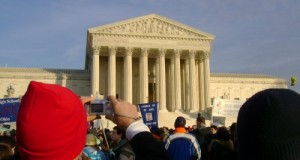
The United States Supreme Court, with several March for Life participants in the foreground. Photo: CNAV files
In so doing, he ignored the clear evidence by none other than Jonathan Gruber. That worthy clearly said: in specifying “established by the State,” Congress meant to exclude any State that didn’t set up an exchange. They did this to punish any State governor and legislature who refused to co-operate with the federal government.
Four Virginia residents sued. As they read the law, they would get no subsidy. So the price of an Obamacare policy would exceed eight percent of their incomes. They sought a declaratory judgment to exempt them from buying any such policy. (What will happen in their specific cases, no one will speculate. Will they get the subsidies? And still buy a policy carrying an impossible deductible?)
Justice Antonin Scalia penned a scathing (and pointedly not “respectful”) dissent. He took note Mr. Justice Roberts had just saved Obamacare from the Constitution a second time. Scalia dissented then, and he dissented in this case. “We should start calling this SCOTUScare,” he said. And:
This case requires us to decide whether someone who buys insurance on an Exchange established by the Secretary gets tax credits,” he wrote. “You would think the answer would be obvious — so obvious there would hardly be a need for the Supreme Court to hear a case about it.
He seems to have waxed angrier with every paragraph. “Gobbledygook!” “Interpretive jiggery-pokery!”
"SCOTUScare" http://t.co/WAC9wjTroh pic.twitter.com/LTYAC9sKJd
— Ryan J. Reilly (@ryanjreilly) June 25, 2015
And:
The cases (of King v. Burwell and the earlier cases of Florida ex rel. Bondi v. Sebelius and NFIB v. Sebelius) will publish forever the discouraging truth that the Supreme Court of the United States favors some laws over others, and is prepared to do whatever it takes to uphold and assist its favorites.
Justice Scalia understands what Chief Justice Roberts does not. The Constitution forbids such favoritism. The Constitution says,
No bill of attainder or ex post facto law shall be passed.
The Constitution also says something about “equal protection of the laws.”
Judge Andrew P. Napolitano accused Chief Justice Roberts of construing the law in “a nearly unheard-of” way “to save the statute.” He then said something more dire: he expects Roberts to “continue to undermine his own credibility as a fair-minded jurist, because he has reached to bizarre and odd contortions in order to save this statute twice.”
Thomas Jefferson warned us
Actually, the CJ has done worse than that. He has destroyed the credibility of the entire Court as a body of fair-minded jurists, faithful to the Constitution. A commentator on Fox News Channel went back to Marbury v. Madison for a comparable ruling. She went back too far. She needed to look no further than McCullough v. Maryland. After that case, then-ex-President Thomas Jefferson warned, “The Constitution is now become a mere thing of wax for the Court to shape and mold as it chooses.” But even Jefferson did not foresee what the Court did today: they made even the statutes of Congress “mere things of wax to shape and mold.”
Can anyone now explain why any person should accept the word of the Supreme Court on anything? Should we not instead say, after President Andrew Jackson, “Chief Justice Roberts has made his decision; now let him enforce it”? Does not the Constitution force us so to defy the Court?
Ironically, our alien “President,” Barack Obama, said the Court shouldn’t have had to take this case up. They took it up, of course, because the judicial circuits split on the subsidy question. That aside, Justice Scalia also said the Court shouldn’t have had to waste its time with this case. Why? Because the law is the law! Or was, before Chief Justice Roberts “shaped and molded” the law like “a mere thing of wax.”
One can readily imagine the reaction by Republican candidates for President in 2016. Twitter has this sample:
There isn't a 'do-over’ provision in our Constitution that allows unelected, SCOTUS judges power to circumvent Congress & rewrite bad laws.
— Gov. Mike Huckabee (@GovMikeHuckabee) June 25, 2015
#SCOTUS has NO authority to rescue Congress from creating bad law. #Burwell ruling is an out-of-control act of judicial tyranny. #ObamaCare
— Gov. Mike Huckabee (@GovMikeHuckabee) June 25, 2015
Today's Supreme Court ruling is another reminder that if we want to get rid of #Obamacare, we must elect a conservative President #RICK2016
— Rick Santorum (@RickSantorum) June 25, 2015
This decision turns common language on its head. Now leaders must turn our attention to making the case that ObamaCare must be replaced.
— Chris Christie (@ChrisChristie) June 25, 2015
Sadly, #SCOTUS has again stretched to save #Obamacare making plain the need to repeal & replace with a patient-centric market based plan.
— George E. Pataki (@GovernorPataki) June 25, 2015
That might now prove more difficult than these candidates say or even think. What will stop the Supreme Court, some day, from invalidating any attempt to repeal the Obamacare law? Might they not say removing the benefit an earlier law provided would constitute a bill of attainder or ex post facto law? (And what about the bill of attainder against all net tax producers? Blank-out.)
Ayn Rand made this point about the philosophy of law in Atlas Shrugged:
When a court is not bound by any laws, it is not bound by any facts. Justice [then] becomes, not an issue of laws, but an issue of men. And your fate depends, not on what you did or did not do, but on whom you do or do not know.
Actually, Justice Scalia called it wrong. He called the “Affordable” (not) Care Act “SCOTUScare.” He should call the Constitution “Obamalaw.”
Why Obamalaw? Because Barack Obama seems to get everything he wants, no matter what the Constitution says. He might have unusual reason to feel confident. In 2005, The New York Times tried to look into a rumor involving Chief Justice Roberts’ adoption of two blond, blue-eyed children, supposedly from Latin America. The rumors began in August of 2005, after George W. Bush nominated him to the court to replace the dead Chief Justice William Rehnquist. Perhaps the Obama administration could do what The New York Times could not, at least not under a Republican administration: unseal the records. If so, they almost certainly would have found then-Judge Roberts adopted two Irish children, in breach of U.S. and Irish law and of international law. Which is to say, of applicable treaties.
This adoption story shows two things. First, John Roberts held himself above the law. Second, he did not fight too hard to “support and defend the Constitution of the United States.” He cared far less about that than about concealing, even now, his crime. Yes, crime. He broke a treaty.
This calls to mind another point Ayn Rand made in the work cited above: no government can effectively govern a population of righteous people. A government needs criminals. And if not enough criminals are available for blackmail, the government must invent them.
How to rescue the Constitution?
The rescue of the Constitution needs drastic measures. The American people must decide now how much they care about it. They must elect a majority in the House of Representatives willing to impeach Chief Justice Roberts for bribery and for treason to the Constitution. And against every Justice who joined that disgraceful opinion.
But the American people must not stop there. They must not only clean House, but Senate, too, to the tune of two-thirds. Because the Constitution needs two-thirds of the Senators present to convict a civil officer of the United States whom the House brings before it on impeachment for treason, bribery, and other high crimes and misdemeanors.
If too few voters care about the Constitution, every taxpayer, and especially every net tax producer, should take part in a taxpayers’ rebellion. This week we learn the Internal Revenue Service willfully destroyed evidence the head of their “Cincy Office” conspired to withhold approval of tax-exempt status from Barack Obama’s political opponents. This same IRS handed out subsidies in breach of the letter of the law. The Supreme Court today gave them license to go on doing that.
Which brings up the last thing Ayn Rand described, again in the work cited. The same remedy she described to Isobel Paterson, when the latter had the bad sense to tell her how much the world “needed” a non-fiction exposition of her philosophy.
Oh, they do, do they?!? What if I went on strike? What if all the creative people of the world went on strike?
What, indeed, could the IRS do then?
In a truer sense than Andrew Jackson could have supposed, his words still ring true. Chief Justice Roberts has made his decision. Now let him enforce it, or remember his oath to the Constitution. That oath trumps his personal discomfiture, or his notions of convenience in enforcement of the law.
Terry A. Hurlbut has been a student of politics, philosophy, and science for more than 35 years. He is a graduate of Yale College and has served as a physician-level laboratory administrator in a 250-bed community hospital. He also is a serious student of the Bible, is conversant in its two primary original languages, and has followed the creation-science movement closely since 1993.



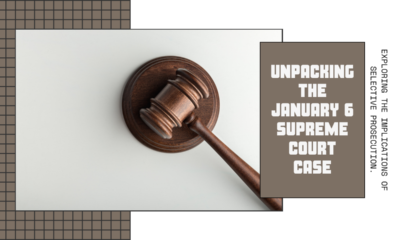

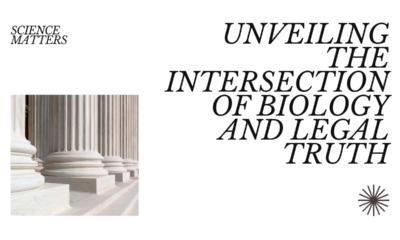

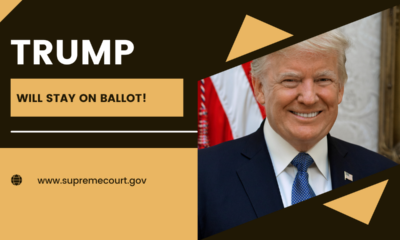



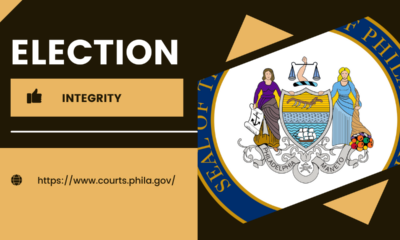



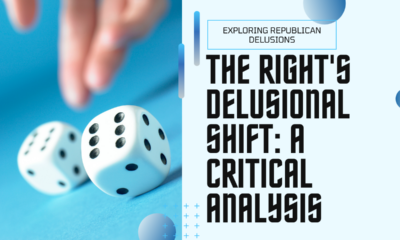

Matthew Farag liked this on Facebook.
The Supreme Court interprets the Constitution, therefore the Constitution says what the Court says it does in our legal system. The score is more accurate at Supreme Court 2, Republican Party 0
That does not negate Justice Scalia’s charge that the Court just turned our government into a government of men, not of law. When they don’t follow the law, they exceed their authority. That’s impeachable.
Robert Houlst liked this on Facebook.
[…] have gone wild in America. Two Supreme Court opinions at the end of this week (King v. Burwell on June 25, and Obergefell v. Hodges, etc. on June 26) show this more starkly than ever. The […]